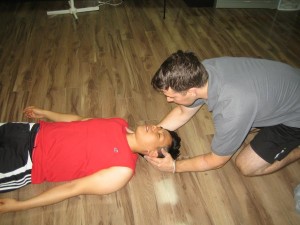A concussion is basically a mild traumatic injury to the brain. The injury can occur after an impact to your head or after a whiplash injury that causes the head and brain to shake back and forth. Take note that concussions are not life-threatening, but they can lead to serious symptoms that would always require medical treatment. Any individual can sustain the injury after a fall, a vehicular accident or any activity. Those who take part in impact sports such as boxing or football are at risk for getting a concussion.

Signs and symptoms of a concussion
Always bear in mind that loss of consciousness will not always occur with a concussion. In some individuals, they experience loss of consciousness, but others do not. The symptoms of concussion tend to vary depending on the severity of the injury. The symptoms usually manifest right after the injury or may not occur for hours, days, weeks or even months after the injury. The signs of concussion include:
- Momentary loss of consciousness after the injury
- Problems with memory
- Confusion
- Dizziness
- Sluggish feeling or drowsiness
- Headache
- Blurred vision or double vision
- Nausea or vomiting
- Sensitivity to noise or light
- Balance problems
- Delayed reaction to stimuli
During the period of recovery after a concussion, the individual might experience the following symptoms:
- Irritability
- Light or noise sensitivity
- Mild headaches
- Concentration difficulties
When to seek emergency assistance
In case you suspect that an individual has a concussion, it is best to see a doctor. If the injury occurs during a game or practice, go to a doctor if the symptoms are severe. Always bear in mind that concussions might be accompanied with spinal injuries. An individual who has a possible neck or back injury should not be moved in order to prevent further damage to the spine.
If the individual experiences the following severe symptoms after an injury, it is important to seek emergency assistance.
- Seizures
- Inability to wake up or coma
- Unequal size of the pupils
- Drainage of blood or clear fluid from the nose or ears
- Abnormal movement of the eyes
- Confusion
- Slurred speech
- Continuous vomiting
- Weak muscles
- Difficulty walking
How a concussion is diagnosed
Once a doctor is consulted, he/she might ask about the injury and its symptoms. A physical examination will be performed to determine if the symptoms of a concussion are present. For serious symptoms, the doctor will request an MRI or CT scan to determine if there are serious injuries. In cases that have seizures, the doctor might also perform an EEG test to monitor the brain waves.
[youtube url=”http://www.youtube.com/watch?v=Mp7jCQkQ4nI”]Preventing concussions
The risk for getting concussions can be minimized by wearing protective gear such as helmets and other safety gear when engaged in sports. If a helmet is used, it should properly fit and worn appropriately.